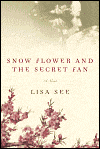 I originally started reading this book for a group that is going around the world in 80 books. I seemed to have fallen completely behind schedule, but I still finished this off! I already had it on my TBR list after seeing it on someone's blog (sorry, but I can't remember whose it was!)
I originally started reading this book for a group that is going around the world in 80 books. I seemed to have fallen completely behind schedule, but I still finished this off! I already had it on my TBR list after seeing it on someone's blog (sorry, but I can't remember whose it was!)Lily is haunted by memories-of who she once was, and of a person, long gone, who defined her existence. She has nothing but time now, as she recounts the tale of Snow Flower, and asks the gods for forgiveness.
In nineteenth-century China, when wives and daughters were foot-bound and lived in almost total seclusion, the women in one remote Hunan county developed their own secret code for communication: nu shu ("women's writing"). Some girls were paired with laotongs, "old sames," in emotional matches that lasted throughout their lives.They painted letters on fans, embroidered messages on handkerchiefs, and composed stories, thereby reaching out of their isolation to share their hopes, dreams, and accomplishments.
With the arrival of a silk fan on which Snow Flower has composed for Lily a poem of introduction in nu shu, their friendship is sealed and they become "old sames" at the tender age of seven. As the years pass, through famine and rebellion, they reflect upon their arranged marriages, loneliness, and the joys and tragedies of motherhood. The two find solace, developing a bond that keeps their spirits alive. But when a misunderstanding arises, their lifelong friendship suddenly threatens to tear apart.
Snow Flower and the Secret Fan is a brilliantly realistic journey back to an era of Chinese history that is as deeply moving as it is sorrowful.With the period detail and deep resonance of Memoirs of a Geisha, this lyrical and emotionally charged novel delves into one of the most mysterious of human relationships: female friendship.
I really enjoyed this read. Set in a remote corner of China in the 1800s, we are given a glimpse into the lives of several different stratas of society - the humble farmer, a comfortably well off family that rents out the fields to the farmers around him, the socially unacceptable life of a butcher and the fading and disgraced aristocrats.
At the age of 7 Lily and Snow Flower were deemed to be "old sames' - signing a contract that says that they will be the closest of friends for all their lives. For Lily, Snow Flower is an exotic young girl, coming from a wealthy family and always wearing beautiful clothes, and yet, when the customary times for visiting each other, Snow Flower always visits Lily's family, never the other way around. For Snow Flower, her time at Lily's house is a chance for her to learn some of the basics of running a home, in anticipation of her marriage.
Going into the details of the rituals relating to foot binding, to the friendship ceremonies, to the marriage ceremonies and the traditions surrounding the changes in a woman's life after she is married, there was plenty of scope for infodump in this book, and yet, the author manages to convey details regarding these events in such a way as to provide the information, but within the structure of the story.
Most of all, this book is a look at the changing nature of a friendship between two women, particularly during the later days of their lives as one of the women grows into a role of leadership in her family and the other gets closer and closer to the edges of society. There were many moving moments, particularly as one of the characters realises that she was the one with the issues, and not the other way around!
A moving and entertaining read, featuring a time and place that I know very little about.
One thing that I did learn from this, or rather had reinforced to me, is that I am really, really bad at reading to a schedule. For the group the book was broken into four sections. I was late finishing the first section, in front on the section section, and then so far behind for the last two sections that it isn't funny!
Rating 4/5
Other Bloggers Thoughts:
The Bookworm - Naida
Some Reads







oo have added this to my TBR list...sounds great...
ReplyDeleteand recommended your recommend to others.
walk to the sound of your own drummer...well, read to it!
This turned up in my 'To Be Collected emails'from the library way faster then I expected.
ReplyDeleteI was enchanted from the word go...until on page 13 I found Third sister described as a funny ORNERY thing...now, I am not Chinese but I suspect ornery is not a chinese word. I will check with my chinese daughter...but for now the book has been put aside. Darn.
Isn't it used in a descriptive sense, and not as part of dialogue?
ReplyDelete